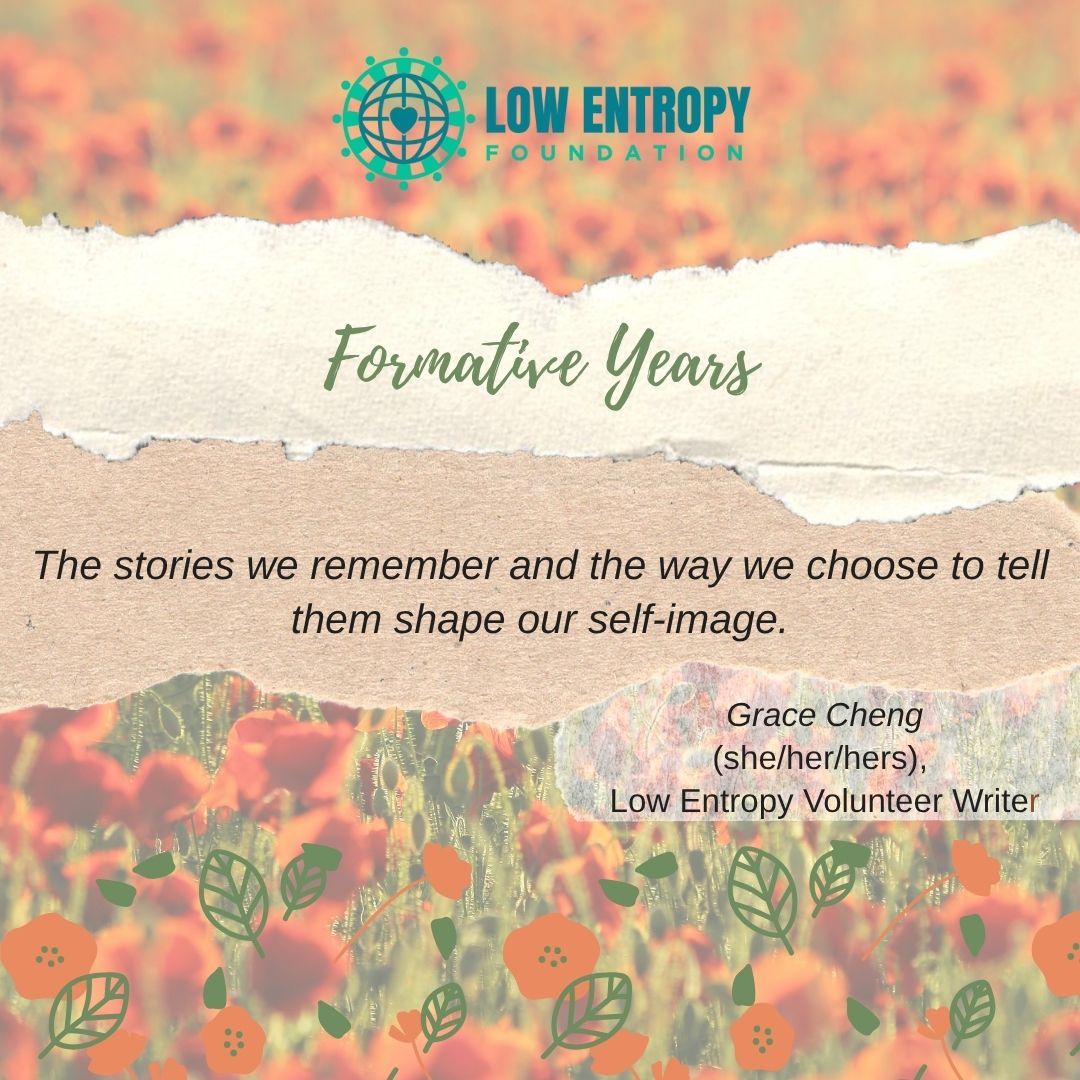Grace Cheng (she/her/hers), Low Entropy Volunteer Writer
Children’s memories lay the foundation for understanding the world in its earliest stages. These memories represent more than mere nostalgic flashes. They are pivotal moments of learning that shape the way we perceive, think and behave. These memories influence us in terms of our values, emotional responses and social behavior. Reflecting on them thoughtfully can help create empathy, resilience and self-awareness. In this article, we discuss how childhood memories help us remain observant, cope with challenges, understand emotions, connect socially and build up a sense of self.
Gaining a Fresh Perspective on the World
Childhood is a time when the world opens up to you and every experience you have is exciting, sensory-rich and deeply felt. Many of our earliest memories include vivid details: the sound of laughter in a playground, the sting of a scraped knee or the warmth of a parent’s voice. Recollections such as these not only evoke sentiment, but also teach us to pay attention to the details.
The act of revisiting such memories as an adult can reactivate our sense of observation. Through this process, we become more aware of the subtle cues around us—body language, tone of voice and changes in routine—that can facilitate effective communication, creativity and decision-making. Childhood experiences teach us how to truly observe life as it unfolds. When carried into adulthood, this skill supports mindfulness and a greater sense of awareness in daily situations.
Developing the Ability to Bounce Back
Childhood memories often revolve around the struggle to overcome small setbacks, such as losing a game or falling during a race. The lessons learned from these moments are valuable lessons in resilience. They provide us with an understanding of how we dealt with difficulty, who supported us and what strategies we used to overcome it.
Reflecting upon these experiences, adults might identify effective patterns of coping. Examples of this might include asking for help, pushing through discomfort or reframing failure as a learning opportunity. Through these early lessons, we can train children to handle emotions, making it easier for them to cope with future stresses with confidence and perspective. As a result, childhood becomes a source of strength.
Understanding Emotions and Moral Development
Childhood is a time when emotions are complex. During this period, joy, jealousy, guilt, wonder and fear are all felt deeply, often for the first time. They root emotional intelligence and moral judgment in these early emotional experiences, especially those involving interactions with others.
The act of sharing a toy, apologizing after an argument or witnessing unfair treatment all serve as examples of empathy and fairness. By reflecting on our responses to such situations, we can gain a deeper understanding of how we have matured or where we still require improvement. Through re-examining these early experiences, adults can gain insight into their understanding and management of both their own and others’ emotions.
Educating in a Social Environment
Most children learn from social interactions. The memories of group play, family traditions, school projects or community events enhance personal development. Interactions such as these serve as informal lessons in communication, cooperation and belonging.
Having such experiences in mind helps us appreciate that learning does not occur in isolation. The encouragement of a teacher or the teamwork of neighbors during a neighborhood game provides us with the opportunity to appreciate mentorship, collaboration and community engagement. By carrying forward these principles, we can influence the way we build families, lead teams and contribute to collective efforts.
Identity is Rooted in Memory
The stories we remember and the way we choose to tell them shape our self-image. The early memories of childhood often show the emergence of important personal traits or values, such as the curiosity that arises when exploring the backyard, the pride that results from completing a puzzle or the courage to express one’s opinions.
Identifying recurring themes in our early memories can help us better understand the direction of our lives. What were the experiences that fueled our passions? Which of these held us back? Self-reflection enables intentional living, in which we build on positive influences and rename or release those that do not serve us anymore.
By using memory as an active tool, we enable ourselves to define who we are and who we want to be.
Cultural and Contextual Reflections
Every child grows up within a social and historical context. Children’s experiences or cultures may be influenced by deeper societal forces like access to education, family structure or cultural norms, even if they appear ordinary to them. As we analyze our memories through this lens, we will better understand the impact that privilege, tradition or systemic inequality has had on our development.
This type of reflection fosters humility and a broader understanding of the world. It enhances our appreciation of the complexity of others’ backgrounds and encourages more ethical and compassionate participation in society. This provides a bridge between personal memory and social awareness and responsible citizenship.
The Transformation of Memory into Growth
We can harness childhood memories through active reflections. By writing about important moments, discussing them with trusted individuals or exploring them in therapy, we can achieve clarity. It is through these practices that we can uncover hidden patterns in how we respond to others.
Mindfulness can also be an important tool in this process, allowing us to sit with our memories—not for reliving them, but for learning from them. Education and mental health professionals can also assist individuals in drawing insights from early experiences to encourage healthier habits, stronger relationships and emotional healing.
Childhood memories serve as more than a snapshot of the past. They serve as lasting guides. They enable us to develop an understanding of the context that shaped our lives. Through them, we may enhance our capacity for empathy, direct our choices and lead more grounded and meaningful lives.
—
Grace has an accounting and finance background. She enjoys reading, writing, listening to music, watching movies and playing sports.

